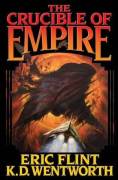
 The human galactic federation is in ruins, and the worlds have devolved to various levels of barbarism. On the planet Bellevue, which is at about the early nineteenth century in development, a young officer named Raj Whitehall and his friend venture into the catacombs under the capital. There, they find an ancient battle computer named Center. With Center’s help, Raj must unite the planet and enable humanity to retake the stars. The story is at least somewhat based on that of the Byzantine general Belisarius.
The human galactic federation is in ruins, and the worlds have devolved to various levels of barbarism. On the planet Bellevue, which is at about the early nineteenth century in development, a young officer named Raj Whitehall and his friend venture into the catacombs under the capital. There, they find an ancient battle computer named Center. With Center’s help, Raj must unite the planet and enable humanity to retake the stars. The story is at least somewhat based on that of the Byzantine general Belisarius.
The first seven novels are written by Drake and Stirling. The last one by Drake and Flint. David Drake writes very detailed outlines, while his collaborators write the actual text.
The first five novels are a set and deal with the conquest/unification of Bellevue. They are nowadays published in two volumes, known as Warlord and Conqueror:
- The Forge
- The Hammer
- The Anvil
- The Steel
- The Sword
 After finishing the conquest of Bellevue, the personalities of Center and Raj are imbued in computers that are sent to other worlds with launched asteroids. This scenario has infinite permutations as human worlds at various levels of development can be written about. The first of these follow-up novels is:
After finishing the conquest of Bellevue, the personalities of Center and Raj are imbued in computers that are sent to other worlds with launched asteroids. This scenario has infinite permutations as human worlds at various levels of development can be written about. The first of these follow-up novels is:
It is a great singleton set on a world with early twentieth century technology. Finally there is the two volume story consisting of:

 Here, we take a serious step “back in time”, as the planet Hafardine is at about Roman Empire level in it’s technology. The Tyrant is rather different in style from the others due to being penned by Flint. However, his trademark dry humor meshes well with the overall thrust of the series.
Here, we take a serious step “back in time”, as the planet Hafardine is at about Roman Empire level in it’s technology. The Tyrant is rather different in style from the others due to being penned by Flint. However, his trademark dry humor meshes well with the overall thrust of the series.
This is great military SciFi, with excellent battlescenes and great characters, not to mention a dose of dry humor. Very highly recommended.

































